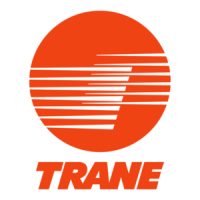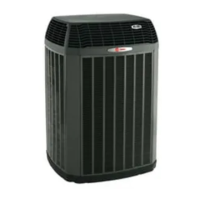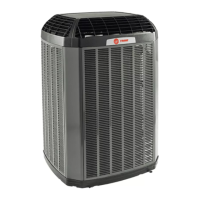Do you have a question about the Trane CONQUEST CGAX Series and is the answer not in the manual?
Overview of manual purpose, warning symbols, and safety recommendations for operation.
Procedures for unit inspection upon arrival and details on warranty terms and conditions.
Recommendation for maintenance contracts and information on manufacturer training programs.
Explains digits for chiller model, tonnage, voltage, plant, sequence, efficiency, agency, and pressure code.
Details digits for condenser temperature, freeze protection, operating map, evaporator connection, coating, heat recovery, starter, detector, and interface.
Covers communication options, I/O modules, sequencer, hydraulic, flow control, buffer tank, accessories, acoustics, and condenser protection.
Explains digits for literature language, voltage protection, performance test, heat control, and special design.
Describes unit components, controls, and general features of CGAX/CXAX chillers and heat pumps.
Explains the meaning of various safety and warning symbols found on the unit.
Guidance on checking shipped accessories and loose parts against the original order.
A comprehensive checklist for ensuring the unit is correctly installed and ready for start-up.
Recommendations for storing the chiller for more than one month to prevent damage.
Lists contractor responsibilities for foundation, rigging, electrical, and water piping installation.
Details on the R454B refrigerant leak detector, its function, and wiring requirements.
Illustrates the internal placement of the refrigerant leak detector sensor for simplex and duplex units.
Provides detailed technical specifications for CGAX units, including cooling capacity, power, electrical data, and components.
Continues the detailed technical specifications for CGAX units, covering fan, heat recovery, dimensions, weights, and system data.
Provides detailed technical specifications for larger CGAX units, including cooling capacity, power, electrical data, and components.
Continues the detailed technical specifications for larger CGAX units, covering fan, heat recovery, dimensions, weights, and system data.
Provides detailed technical specifications for CXAX units, including cooling capacity, power, electrical data, and components.
Continues the detailed technical specifications for CXAX units, covering fan, heat recovery, dimensions, weights, and system data.
Provides detailed technical specifications for larger CXAX units, including cooling capacity, power, electrical data, and components.
Continues the detailed technical specifications for larger CXAX units, covering fan, heat recovery, dimensions, weights, and system data.
Guidelines for selecting the unit's location, considering sound, clearances, and foundation requirements.
Procedures for rigging, lifting, isolating, and leveling the unit during installation.
Instructions for flushing and connecting the evaporator water piping to the unit.
Requirements for drainage connections and chilled water system piping, including vents and gauges.
Explains the importance of water volume for temperature stability and factors influencing it.
Details minimum water volumes for comfort applications and guidance on expansion tank setup.
Discusses options like heaters, freeze inhibitor, and water pump control for preventing freezing.
Explains how to adjust low pressure and antifreeze setpoints on the chiller controller for protection.
Guidance on using glycol for freeze protection, including concentration levels and considerations.
A graph illustrating the relationship between LP setting and leaving water temperature for freeze protection.
A curve showing recommended glycol concentrations for effective freeze protection at various temperatures.
Graphs showing water pressure drop versus water flow for CGAX units without pump packages.
Graphs illustrating available head pressure versus water flow for CGAX units with pumps.
Graphs showing water pressure drop versus water flow for CXAX units without pump packages.
Graphs illustrating available head pressure versus water flow for CXAX units with pumps.
Defines operating ambient and water temperature ranges for CGAX cooling-only models.
Defines operating ambient and water temperature ranges for CXAX heat pump models in cooling mode.
Defines operating ambient and water temperature ranges for CXAX heat pump models in heating mode.
Graph showing pressure drop across the heat exchanger for cooling-only CGAX units.
Graph showing pressure drop across the heat exchanger for CXAX heat recovery units.
General guidelines for field-installed wiring, grounding, and component compliance.
Lists components provided by the installer and guidelines for power supply and control wiring.
Illustrates the locations for incoming power and low voltage wiring connections on the unit.
Directs users to general data tables for detailed electrical specifications of various unit configurations.
Information on control power supply, low voltage wiring, and customer options like relays.
Details on integrating external auto/stop, heating/cooling selection, auxiliary setpoints, and demand limits.
Description of the analog output signal that communicates the unit's active capacity percentage.
Specifies requirements for shielded, twisted-pair wiring for communication links and maximum lengths.
Provides an overview of CGAX/CXAX unit operation, key components, and control systems.
Details the refrigerant cycle, including the role of the electronic expansion valve and oil management.
A schematic diagram illustrating the refrigerant system of a duplex cooling-only CGAX unit.
A schematic diagram illustrating the refrigerant system of a simplex cooling-only CGAX unit.
A schematic diagram illustrating the refrigerant system of a duplex heat pump CXAX unit.
A schematic diagram illustrating the refrigerant system of a simplex heat pump CXAX unit.
Explains the oil separation and circulation within the scroll compressor during operation.
Presents water charts for the hydraulic module on units without an installed pump package.
Presents water charts for the hydraulic module on units with an installed pump package.
Explains the principle of Variable Primary Flow (VPF) and its impact on unit design and pump selection.
Illustrates the components and connections of a Variable Primary Flow system.
Lists the control components and communication interfaces used in CGAX/CXAX units.
Information on the TD7 operator interface and the Tracer TU service tool for technicians.
A checklist of tasks to perform before calling Trane Service for unit start-up.
Emphasizes balanced water flow and checking pressure drop through the evaporator.
Crucial safety warnings regarding electrical hazards and handling live components during start-up.
Step-by-step instructions for initiating the unit's start-up sequence.
Key operating parameters to verify after the unit has started, including voltage, currents, and temperatures.
Final checks on unit cleanliness, valve positions, and controller settings using the Tracer TU tool.
Important cautions regarding motor insulation, phase imbalance, oil emulsion, and compressor rotation.
Checklist items covering unit placement, leveling, clearances, and rubber pad position.
Checklist items for thermometers, manometers, water flow, pressure drop, and leaks in the chilled water circuit.
Checklist items for mains power switch, fuses, electrical connections, and rotation direction.
Overview of the microprocessor control system and basic checks for correct unit operation.
Procedures for weekly start-up, weekend shutdown, seasonal shutdown, and seasonal start-up.
General guidance on required maintenance, keeping service records, and operator logs.
Details on inspection visits after 500 hours, monthly preventive visits, and annual preventive visits.
Important cautions and warnings related to maintenance procedures, oil, cleaning, and safety.
Information on pump maintenance and service details for CSHD compressors, including oil equalizer lines.
Steps for replacing a failed compressor, including lifting, oil changes, filter replacement, megging, and current imbalance.
Guidance on refrigerant piping, compressor crankcase heaters, and cleaning condenser coils.
Procedures for maintaining the brazed plate heat exchanger evaporator and guidelines for its replacement.
Detailed instructions and precautions for cleaning condenser coils, especially micro channel types.
Procedures for repairing micro channel coils and regular maintenance of flange connections.
Safety precautions and maintenance steps for water pumps, including draining and cleaning.
Annual calibration procedures for the R454B refrigerant leak detector, including sensor replacement and calibration methods.
Common problems and recommended actions when the compressor fails to start or stops prematurely.
Troubleshooting steps for compressor stops related to low or high-pressure switch trips.
Diagnosing and resolving issues where the compressor stops shortly after starting.
Troubleshooting steps for when the compressor runs without stopping, often related to cooling demand or airflow.
Troubleshooting common problems like low oil level, gradual oil fall, and compressor noise or knocking.
Addresses issues related to insufficient cooling capacity and high discharge or suction pressures.











